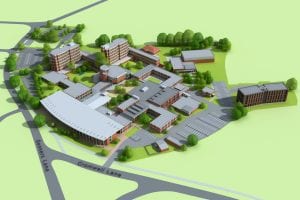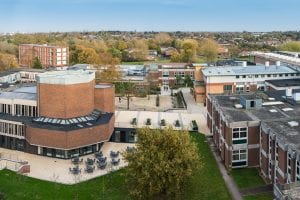Names of Buildings and Quads
Dominic Barberi (1792-1849) an Italian theologian, member of the Passionist Congregation and a missionary to England. When preaching in the midlands he received our founder Saint John Henry Newman into the Catholic Church, after Newman made his confession to him. Newman relates in his Apologia of how Dominic arrived soaked from the rain and as he was drying himself by the fire Newman knelt and asked to be received into the Catholic Church. Beatified by Pope Paul VI in 1963.
Erasmus Darwin (1731-1802) an English physician who was one of the key thinkers of the Midlands Enlightenment and a founding member of the Lunar Society of Birmingham. A natural philosopher, physiologist, slave trade abolitionist, inventor and poet; he was one of the great polymaths of the 18th Century. Darwin wrote a treatise on how girls should be educated in schools, which is regarded as a modernising influence in Education of the era.
Genevieve Dupuis (1813-1903) was the foundress of the English congregation of the Sisters of Charity of St. Paul the Apostle. In 1847, as a Sister of St Paul of Chartres, she came to England to establish a free school for the poor. During over fifty years in England, Mother Geneviève oversaw the opening of 88 Convents engaging in education, health, child care and teacher training.
Archbishop George Dwyer (1908-1987) was an active participant in the reforming Second Vatican Council (1963-65) and appointed as Archbishop of Birmingham in October 1965. He was elected president of the Bishops’ Conference, becoming the only bishop ever to hold that position who was not also Archbishop of Westminster. Archbishop Dwyer gave the land for the foundation of Newman and supported its conception and creation.
Duncan Edwards (1936-1958) became the youngest post-war full England international footballer aged 18, a record that stood for 42 years. He earned 18 full England caps, and played 177 games for Manchester United. A member of the famous ‘Busby Babes’ team, he died of injuries sustained in the Munich Air Disaster and despite the tenderness of his years, he was already regarded as a truly great player.
Sir Edward William Elgar (1857-1934) was an English composer, of world renown. Among his best-known compositions are orchestral works including the Enigma Variations, of which the Variation IX (Adagio) “Nimrod” is always played at the Cenotaph in London on Remembrance Sunday and the Pomp and Circumstance Marches, which contains the tune “Land of Hope and Glory”, an integral part of the Last Night of the Proms.
Paulo Freire (1921-1997) was one of the most influential educational academics on educational practice and liberation of the late twentieth century. He believed there should be dialogue between pupil and teacher, that understanding the world was as important as understanding the word, that understanding should build social capital. His Pedagogy of the Oppressed is a much quoted educational text.
Julian of Norwich (1342-c.1413) was born during the time of the Black Death. It was in 1373 that she received her visions, revelations of God’s love centering on the cross of our Lord. She recorded her Revelations, in the Middle English of the day, in her book, called THE REVELATIONS OF DIVINE LOVE, the first book to be written in English by a woman.
Catherine McAuley (1778-1841) was an Irish nun, who founded the Sisters of Mercy in 1831. The Order is associated with teaching, especially in Ireland, where the nuns taught Catholics (and at times Protestants) at a time when education was mainly reserved for members of the established Church of Ireland. In the final 10 years of her life there were over one hundred Sisters of Mercy established in foundations in Ireland and England.
Oscar Romero (1917-1980) was appointed the fourth Archbishop of San Salvador. He spoke out against poverty, assassinations, social injustice, and torture; and denounced the persecution of members of the Catholic Church. He was assassinated whilst celebrating Mass in a hospital chapel. His funeral Mass was attended by more than 250,000 mourners from around the world.
St. Chad (c.634-672) was a missionary to Mercia, who brought Christianity to the midlands and became the first bishop of Lichfield. He was venerated as a saint immediately after his death and remained the centre of an important cult, focussed on healing, throughout the Middle Ages. His relics now reside in the Catholic Cathedral named after him in Birmingham.
Joseph Sturge (1793-1859) was an English Quaker renowned for his work as an abolitionist and activist. He came to work in Birmingham in 1822 and was appointed an alderman of Birmingham in 1835. He worked throughout his life in Radical political actions supporting pacifism, working-class rights, and the universal emancipation of slaves.
Quads are named after:
Catherine Hutton (1756-1846) was an English letter writer and novelist. Born in Birmingham she published a number of novels and wrote a history of the Queens of England. She built up a collection of over two thousand letters, some of which were published after her death.
Harriet Martineau (1802-1876) A novelist and journalist Martineau wrote over 50 books and contributed to Charles Dickens’ journal, Household Words. She campaigned against slavery, and had a powerful impact on the treatment of women in 19th century England. She is buried at Key Hill in Birmingham.
Louisa Ryland (1814-1889) Is a very important benefactor to Birmingham. She gave Cannon Hill Park and
Small Heath Park to the city. She also gave considerable funds to the Women’s Hospital, Jaffray Hospital and the School of Art.
Jane Webb (1807-1858) Born in Bartley Green. She wrote The Mummy, the novel from which a million films have stemmed. She became a gardening writer and married the designer of the Birmingham Botanical Gardens, John Claudius Loudon.


